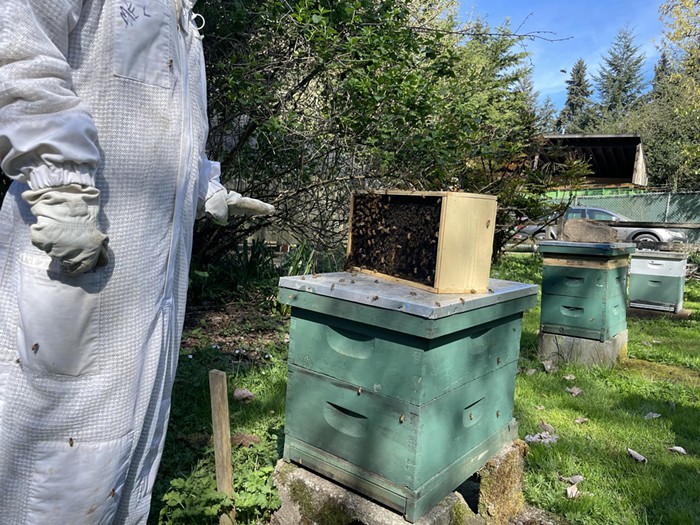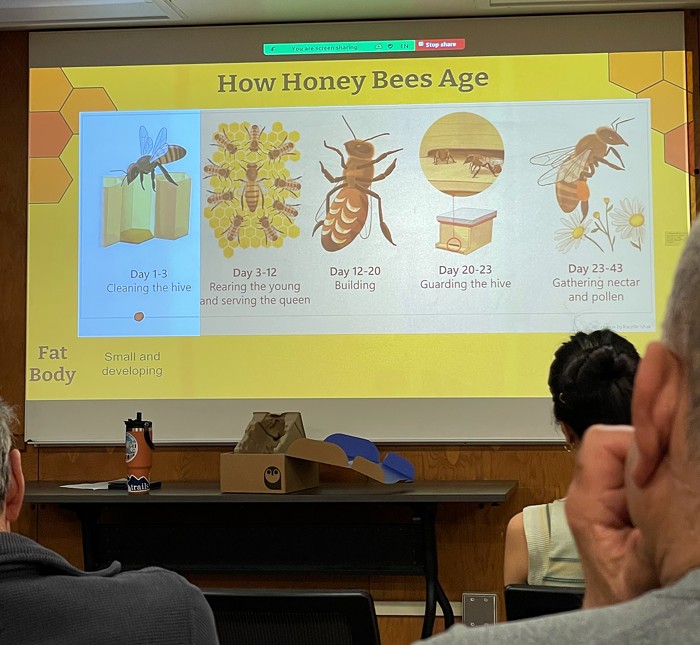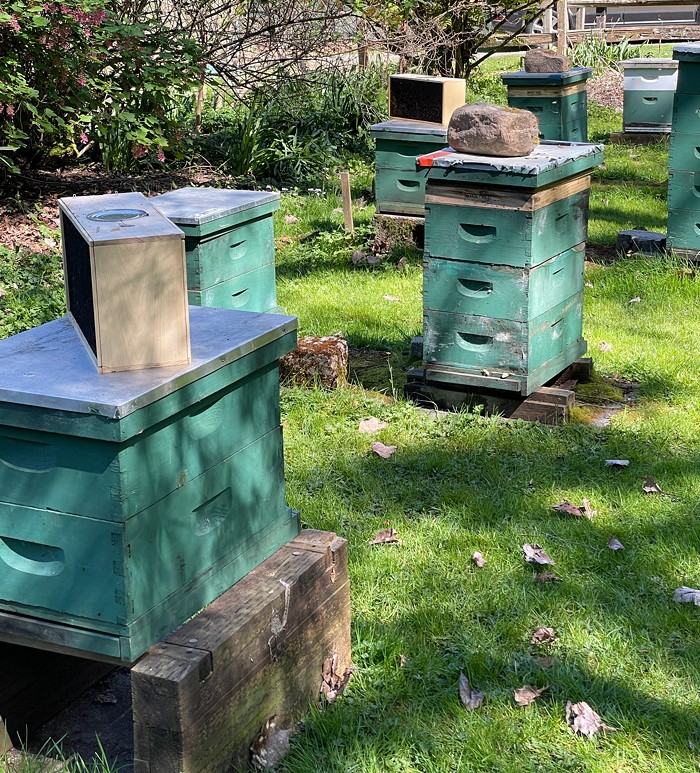I hurried through the arboretum. I caught glimpses of the fresh blooms in Rhododendron Glen. I paid tribute to the last petals clinging to the towering camellia bushes as I brushed past.
Breathing heavy, I jogged into the Puget Sound Beekeepers Association (PSBA) apiary. For my latest exploration into Seattle subcultures, I got into the hives with Seattle’s hobbyist beekeepers.
Former apiary manager and 12-year veteran hobbyist beekeeper Maureen Sullivan asked that I not reveal the exact apiary location because the last time someone wrote about the apiary, queen bees from three hives went missing. And queens are expensive. These ones were around $60 a queen.
“People came in and stole them,” Sullivan said. (If you are reading this, please do not steal any queens.)
“We can’t have this fenced off,” she gestured to the grassy area lined with stacks of bee boxes. “There’s been damage, people tip hives while jumping over them—frat boys. It’s really sad.”
And yet, frat boys hazing each other by vaulting over bee boxes is the least of the worries for the hobbyist beekeeper in the Pacific Northwest. Beekeeping is hard. Nearly half of all hobbyist beekeepers' hives die each year due to a cocktail of complications including climate change, starvation, and nasty mite infestations. To complicate things, Seattle’s climate is not one preferred by honeybees, all of which are non-native. Yet, there are a lot of beekeepers here. That’s why clubs such as the PSBA are important. Together, the beekeepers help each other, through shared knowledge and resources, to keep their bees alive.
 Stop fucking with hives, frat boys! NATHALIE GRAHAM
"The Craziest Beekeeper I Know"
Stop fucking with hives, frat boys! NATHALIE GRAHAM
"The Craziest Beekeeper I Know"
To get the beekeeping buzz, I talked with Dawn Beck, a retired accountant and former chief financial officer at Shoreline Community College. Beck is now the president of PSBA, the manager of two other bee groups in Washington, a board member of the Washington State Beekeepers Association, and a delegate to the American Beekeeping Federation.
“I’m one of the craziest beekeepers I know,” Beck said. “I’m involved in so, so many things. It’s almost more of a full-time job now. I just love it.”
Beck manages around 50 hives. Each hive has around 30,000 to 50,000 bees. That’s, as she put it, a lot of bees.
“I just like taking care of things,” Beck said. But, it’s more than that. Beck loves learning. In the eight years since she’s been keeping bees, Beck earned a master beekeeper certificate from the University of Montana, and she’s currently in the process of earning a master beekeeping certificate from Cornell University.
Beck’s accountant friend, Elizabeth Schirmer, introduced her to the hobby. Schirmer and her husband, Pat Schirmer, who works at Boeing, started keeping bees back in 2007 when they went to a beekeeping class on Phinney Ridge one Wednesday instead of their typical Wednesday evening sail.
“Once I started doing it, I’ve always done it,” Pat said. “My only regret is I didn’t start sooner.”
Pat loves the sound, he loves the way the gear and the hive parts make the garage smell. At their house in Ballard, the hives sit outside the sliding glass door which leads to their bedroom. The hum of the bees creates the perfect white noise for an afternoon nap, he said. One year—in 2009—the pair owned a stack of hives eight high. They produced 150 gallons of honey that year.
Elizabeth and Pat both said Beck’s hobbies always absorbed her, it’s just who she is. Once she got a taste for it, Beck threw herself into beekeeping, which was a challenge at first.
“It’s really hard to learn,” Beck said. “Because I was working full-time still when I was starting, I didn’t have the time to dedicate and I didn’t have a mentor.”
Now retired in the Skagit Valley with her own bees, Beck dedicates her time to making it easier for people like her to get started.
“I spend a lot of time mentoring and teaching other people so they don’t have to learn the hard way,” she said.
 Happy birthday, honey bees. NG
Bee Talk
Happy birthday, honey bees. NG
Bee Talk
A crowd of nearly 30 people gathered in a room at the University of Washington’s Center for Urban Horticulture for the PSBA’s monthly meeting. Twenty more tuned in via Zoom. Trays of cheeses and fruits, a hot water kettle, a variety of Trader Joe’s teas, and a half-empty jar of PSBA honey dotted the counter. Multiple attendees wore socks with sandals. I counted at least four bee shirts.
The nearly three-hour affair covered community updates, beginning beekeeper lessons, hive advice, and a bee talk from Beck, who shared a presentation on the varroa mite, the thing she believes is responsible for mass-hive death.
Beck, who has blonde hair with some pink streaks in it, started her presentation with bee anatomy, specifically a part of each bee called the fat body, which produces a ton of necessary protein as well as natural inoculative properties for bees. The bees share this produced substance with the whole hive. Bees live an average of six to eight weeks, but if they were to keep their fat body for themselves instead of feeding the whole colony, they would live for two years, Beck said. She hit on the selflessness of bees and the altruistic behavior necessary for colony survival.
I thought about the group of people in this room, smiling to myself when considering how similar they were to the hives of bees they tended.
The varroa mite, Beck said, consumes this fat body when it latches onto the bees. This stunts bee growth, starves colonies, weakens their immunity, and makes them less sturdy for the winter. Thus, the mass die-off. Beekeepers must regularly check for and manage mites if they want their hives to survive, Beck said.
Brian Silverstein, who works in tech, started beekeeping when he moved up to Seattle four years ago. “My wife and I have been interested in trees and plants and bugs and stuff forever,” he said. So, when his wife found PSBA, it was only natural they’d get their own bugs.
The PSBA is a community invested in everyone’s well-being—or, at least, the well-being of their hives.
“There are some people here who have been keeping bees since before you or I was born,” Silverstein said. “Everyone loves to share their information. I bought my first bees from someone I met here.”
Bruce Becker, for instance, is an attorney who started beekeeping in 1968, when he was 14 years old. His dad’s uncle kept bees on Bainbridge Island and, so, as soon as he had enough money to do so, Becker bought himself a hive. He made his own hive tools, many of which he still has today.
“I enjoy parts of [beekeeping]” Becker, wearing a faded KUOW hat, said, his sense of humor wry. “I’m getting to the point where it’s harder to do the things I could do 10 years ago.”
 Hives for days. NG
Hives for days. NG
Having help from the PSBA community, or from family, comes in handy.
Silverstein and his wife work together on the hives at their Northgate home.
“My eyes are terrible,” Silverstein said, “When you’re doing your hive inspections, you know, you’re looking for larvae, you’re looking for eggs—I can’t see eggs. I can either get out my phone and take pictures and look at them later, or [my wife] comes along and I pull the frame out of the hive and I say, ‘Here, are there any eggs on there? Any larvae on there?’”
Sam Culliton, a commercial diver, started beekeeping at his home in Shoreline last summer after buying bees from a PSBA member. He already has two hives, both which survived the winter.
“It’s a little bit like a puzzle,” Culliton said. “A lot of people are really attracted to the honey side—that’s totally a side thing for me. I love learning about it.”
The PSBA and its members have a wealth of information which Culliton absorbs. He’s sharing that information with his family. Of his two kids, his daughter is the one who’s really taken to it.
“It is amazing seeing some of the things she asks about and some of the things that I share with her that she—we have other neighborhood kids who come by to see [the bees] and I hear her telling them the same things,” he said. “I’m like, ‘Wow, not only did she actually listen, but she cares enough to share with others.’ If that was all I got from [beekeeping] that would be awesome.”
 Hi from the hive. NG
Apiary Day
Hi from the hive. NG
Apiary Day
The PSBA apiary hosts two hands-on learning sessions a month, however, if the weather is below 55 degrees and if it’s raining, class won’t happen.
The day I joined the apiary work party was the day PSBA introduced three new hives. Over the winter, three of PSBA’s hives died, one from starvation, another from a mite explosion, and the last hive got stuck under sponges placed in the hive for treatment and, well, also starved. Lots of hives die over the winter.
“What nobody talks about in beekeeping is drudgery,” Sullivan said. “It’s just drudgery. It’s not high drama. It’s not romantic. You spend a lot of time cleaning your gear, scraping your gear, worrying about your bees. I wake up and worry about mine.”
Still, people bee keep.
“There is a lot of beekeeping in Seattle,” Sullivan said, “and we just hope people get the education they need instead of, like, going off of Martha Stewart—not that I don’t love Martha Stewart, but did you ever look at that article where she’s on the front? She’s got her bee suit all pinned in the back so tight and fitted, and it’s like, ‘You can’t move in that.’”
The key to being a good beekeeper, according to Sullivan, is being responsible. And being responsible means learning how to tend to your bees.
The work parties are essential to beekeeping education. Anyone can join, regardless of if they have bees.
Emma Cutner, 23, a recent college grad who worked on a beekeeper’s farm last summer in France, came for more beekeeping experience.
She asked people hawking honey at local farmers markets whether she could help them with their bees. Someone pointed her to PSBA. She, admittedly, doesn’t even really like the taste of honey. She likes being around the bees.
“It just smells almost nostalgic,” Cutner said. “Like when you were playing in your yard as a kid. The bees smell like outside.”
For two hours under the mild spring sun, the nine or so of us in attendance transferred bees to their new hives.
This involves dumping small boxes filled to the brim with buzzing bees into a hive box and introducing a queen. The queens are trapped inside, too, but in a separate, tinier box. The hive learns about her this way, and, if they like her pheromone mix, they cling to her small cage as if pledging fealty. The beekeeper whacks the bigger box full of lesser bees, shaking it until a bee deluge pours out of a round hole in the box’s base with a “whoomph.” Those bees fill the beehive box. Beekeepers then remove the stopper to the queen’s tiny cage and replace it with—you guessed it—a little marshmallow. The beekeeper adjusts the panels inside the hive, places the caged queen in the middle, and closes the lid. The queen’s subjects, her worker bees, will then eat the marshmallow and free her from her small prison.
 Eat the marshmallow, free the queen. NG
Eat the marshmallow, free the queen. NG
I pulled on a loaner bee suit, slipping into the too-big meshy fabric (Martha Stewart would never). Apiary manager Kathleen DeVilbiss zipped my hood shut. She wore rubber bands around her ankles, presumably to keep the bees from crawling up her legs. I didn’t have any rubber bands for my pant cuffs. I hoped for the best.
“The first time you start touching bees is always pretty amazing,” DeVilbiss said.
I filled the hive full of newly transferred bees with the panels we removed, edging the bee-covered panels closer to make everything fit with a hive tool, a long flat metal instrument. The air coming off the hive felt hot and frenetic, alive with the beat of thousands of wings, the whir of a hive disturbed. Every time I moved my head, the movement of my bangs inside my bee suit looked like a bee in my peripheral vision. I quelled any panic, ignoring the phantom feeling of something crawling on the back of my neck. Bees flew around my head, my hands, my arms.
I can't say putting my hands in the hives altered my world much. But, it was the community aspect, both from the bees and the beekeepers, that struck me.
I dove into the beekeeping world at a time when I was untangling myself from my own hive. My partner, Harry, and I moved into a house with two of my best friends almost two years ago. This month, we moved out. In that time, we all became close, our routines and lives more intertwined than they'd ever been, a glorious change from the suffocating solitude of the early pandemic. We lent ears to each other's struggles, doled out advice when necessary, gave our time to help with each other's pets, and, sometimes, stole each other's groceries.
I'd lived with all of these people before—my friends in college and after, with Harry after that—but, never all together, not like this. In recent months, after getting engaged, Harry and I realized it was time to have our own space again. As we separated our lives, deliberating whose spoons were whose, the grief hit me: I would likely never live like this again. While there is part of me that's excited to only worry about just me and Harry and not our metaphorical hive, it was nice to be surrounded by people who I loved, to live communally in a way that benefited all of us.
Any ideas on which Seattle subculture I should explore next? Want me to tag along with you on your favorite hobby or pastime? Send me tips at playdate@thestranger.com.